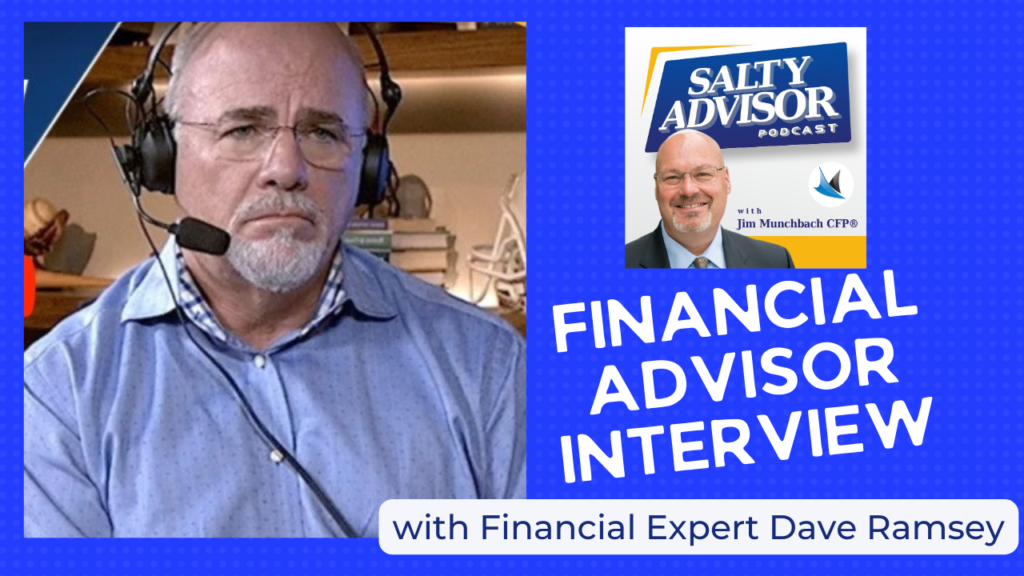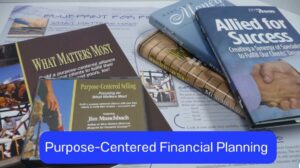Financial Advisor Interview: Tips from Dave Ramsey
How to find a reliable financial advisor or investment company? It is a very common question and one that our clients had to ask before they found us. Our prospective clients are asking the same questions…
Recently, I stumbled upon a video on the Dave Ramsey show, where Dave discusses the importance of finding the right financial advisor and shares his tips on what to look for when searching for one. Being a renowned financial expert, Dave Ramsey’s insights are valuable for anyone looking for financial advice.
Financial Advisor Interview with Dave Ramsey
In this video from the Dave Ramsey show, a caller asks for advice on how to find a new investment company after being burnt by a previous one. Dave advises that it is important to remember that managing investments is the caller’s responsibility and that they need to seek out an investment advisor who has the heart of a teacher, rather than a salesman. He also recommends finding an advisor who shares the same money philosophies as the caller and suggests using his SmartVester program to find a vetted financial advisor in their area. Dave is known as an expert in personal finance but I’m convinced his real talent in as a Marketing Guru, including his ability to grow revenue through things like Affiliate Marketing (eg. his SmartVester program).
About the Creator
The Dave Ramsey Show is a popular radio show and podcast that provides financial advice to people in the US. Dave Ramsey is a financial expert, author, and speaker who has helped millions of people get out of debt and achieve financial freedom. He has authored several best-selling books on personal finance and also hosts a YouTube channel with over 2 million subscribers.
Financial Advisor Interview Key Takeaways
-
Your investments are your responsibility, but you need the counsel of a financial expert. Look for an advisor who has the heart of a teacher, not a salesman.
-
Your financial advisor’s value system should align with yours. Ensure that you agree on the basics of money philosophy, such as debt and investment.
-
The SmartVestor program by Dave Ramsey’s team can help you find financial advisors in your area who have been vetted for their clean code of conduct and teaching-oriented approach.
Step-by-Step Process
-
Take responsibility for your investments and seek expert advice from a financial advisor.
-
Look for a financial advisor who has the heart of a teacher, not a salesman. Ensure that they explain things to you so that you can make informed decisions.
-
Make sure that your financial advisor’s value system aligns with yours. Ask them about their philosophy on money, such as debt and investment.
-
Use the SmartVestor program by Dave Ramsey’s team to find financial advisors in your area who have been vetted for their clean code of conduct and teaching-oriented approach.
Resources
-
The SmartVestor program by Dave Ramsey’s team helps you find financial advisors in your area.
-
Dave Ramsey’s YouTube channel offers a wealth of personal finance advice and tips.
My Best Advice
When looking for a financial advisor, it’s essential to remember that your investments are your responsibility. Take the time to educate yourself on basic financial principles, and find an advisor who has the heart of a teacher and a value system that aligns with yours. Use the SmartVestor program or other similar resources to find reliable financial advisors in your area.
FAQ
-
Should I hire a financial advisor even if I have basic financial knowledge?
-
Yes, seeking advice from a financial advisor is always a good idea, regardless of your financial knowledge.
-
What are some red flags to look for when searching for a financial advisor?
-
Avoid advisors who have a history of poor performance, make unrealistic promises, or pressure you into investing in something you’re uncomfortable with.
-
Should I only consider financial advisors in my area?
-
No, you can also work with advisors remotely. However, it’s important to ensure that they are licensed to operate in your state.
-
Can I switch financial advisors if I’m unhappy with their service?
-
Yes, you can switch advisors at any time. Make sure to communicate your concerns with your current advisor and take steps to ensure a smooth transition.
-
Can I trust financial advisors recommended by friends or family?
-
While personal recommendations can be helpful, it’s still essential to vet the advisor thoroughly to ensure they’re a good fit for you.
Links to Financial Advisor Interview
Twenty Tweets for the Financial Advisor Interview
-
“Before hiring a Financial Advisor, ask if they are independent or affiliated with a larger financial institution. Independence matters!”
-
“Protect your investments by asking if your advisor is a fiduciary. This means they are legally obligated to act in your best interest.”
-
“Don’t let hidden fees eat into your investments. Ask your advisor if there are any fees you should be aware of before signing on.”
-
“Conflicts of interest can impact your investment returns. Make sure your advisor discloses any potential conflicts to you.”
-
“Ask your advisor how they select investments to recommend. Understanding their criteria is crucial for making informed decisions.”
-
“Customized financial plans are key. Ask your advisor about their process for creating a plan that is tailored to your unique needs.”
-
“Communication is key. Ask your advisor how they will keep you informed of any changes to your financial plan or investment strategy.”
-
“Transparency is key. Ask your advisor to provide a clear breakdown of all fees and expenses associated with managing your investments.”
-
“Affiliations matter. Ask your advisor if they are affiliated with any specific financial products or services that may impact their recommendations.”
-
“Get peace of mind by asking your advisor if they can provide references or testimonials from other clients they have worked with.”
-
“When searching for a Financial Advisor, it’s important to ask if they are independent or affiliated with a larger institution. #financialadvisor #independence”
-
“Make sure your Financial Advisor is legally obligated to act in your best interest by asking if they are a fiduciary. #fiduciary #financialplanning”
-
“Don’t be afraid to ask about any commissions or incentives your Financial Advisor may receive for recommending specific financial products or services. #hiddenfees #financialplanning”
-
“Transparency is key! Ask your Financial Advisor about any potential conflicts of interest and how they disclose them to clients. #conflictsofinterest #financialplanning”
-
“Find out how your Financial Advisor selects investments and what criteria they use to ensure the best options for your financial goals. #investmentstrategy #financialplanning”
-
“Make sure your Financial Advisor is creating a customized financial plan that aligns with your unique financial goals and needs. #customizedplan #financialplanning”
-
“Stay informed about any changes to your financial plan or investment strategy by asking how your Financial Advisor communicates with clients. #communicationiskey #financialplanning”
-
“Get a clear breakdown of all fees and expenses associated with managing your investments by asking your Financial Advisor for a comprehensive list. #feesandexpenses #financialplanning”
-
“Choosing an independent Financial Advisor who is a fiduciary ensures they have your best interests in mind. #choosewisely #financialplanning”
-
“Make sure your Financial Advisor is transparent about their affiliations with specific financial products or services that could impact their investment recommendations. #transparency #financialplanning”
50 Questions Clients Ask in Financial Advisor Interviews:
-
What is your investment philosophy and how does it align with my personal financial goals?
-
What experience do you have managing investments in the specific areas I am interested in?
-
What are your fees and how are they structured?
-
How do you communicate with your clients and what is your typical response time?
-
Can you provide references from other clients who have worked with you?
-
How do you stay informed about changes in the market and adjust investment strategies accordingly?
-
What licenses and certifications do you hold? Are you registered with any regulatory bodies?
-
How do you manage risk in investment portfolios?
-
What is your track record for helping clients achieve their financial goals?
-
How do you ensure that you are always acting in the best interests of your clients?
-
What is your investment philosophy?
-
What experience do you have in the financial industry?
-
What type of services do you offer?
-
How do you communicate with your clients?
-
What are your qualifications and credentials?
-
How do you charge for your services?
-
Can you provide references from current or past clients?
-
How do you stay up-to-date on industry changes and trends?
-
How do you handle conflicts of interest?
-
How will you help me achieve my personal financial goals?
-
What are your qualifications and experience in the financial industry?
-
How do you charge for your services, and what are the fees associated with managing my investments?
-
What is your investment philosophy, and how do you approach risk management?
-
Can you provide references or testimonials from other clients you have worked with?
-
How often will we meet to review my portfolio and discuss any changes to my financial goals?
-
What types of investments do you typically recommend, and how do you determine which ones are best for my financial situation?
-
How do you ensure that my investments are properly diversified and aligned with my long-term financial goals?
-
What happens in the event of a market downturn or significant economic changes?
-
Do you have any conflicts of interest or affiliations with any financial products or services?
-
How do you stay informed about the latest trends and developments in the financial industry, and how do you share this knowledge with your clients?
-
Are you an independent advisor, or do you work for a larger financial institution?
-
Do you operate under a fiduciary duty, meaning you are legally obligated to act in my best interests?
-
How do you disclose any potential conflicts of interest that may arise in the course of managing my investments?
-
Do you receive any incentives or commissions for recommending certain financial products or services?
-
What is your policy on hidden fees or additional costs associated with managing my investments?
-
How do you ensure that my portfolio is properly diversified, and how do you select the investments that go into it?
-
What is your philosophy on risk management, and how do you work with clients to minimize risk?
-
How often will we communicate and review my portfolio, and how do you respond to changes in my financial goals or circumstances?
-
Are you familiar with the latest regulations and industry standards regarding financial advice, and how do you stay up-to-date on changes?
-
Can you provide references from clients who have successfully achieved their financial goals under your guidance?
-
Are you an independent advisor, or do you work for a larger financial institution?
-
Are you a fiduciary, meaning you are legally obligated to act in my best interest?
-
Do you receive any commissions or incentives for recommending specific financial products or services?
-
Are there any hidden fees associated with your services or the investments you recommend?
-
How do you disclose any potential conflicts of interest to your clients?
-
Are you affiliated with any specific financial products or services, and does this affiliation impact your investment recommendations?
-
How do you select the investments you recommend, and what criteria do you use?
-
What is your process for creating a customized financial plan for each client?
-
How do you communicate with clients regarding any changes to their financial plan or investment strategy?
-
Can you provide a clear breakdown of all fees and expenses associated with managing my investments?







